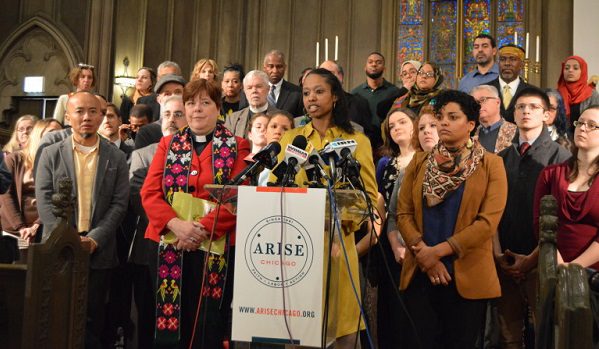
I am flummoxed and flabbergasted by the events of the last two weeks. – Professor Larycia Hawkins
Wheaton College has begun the process of firing Professor Larycia Hawkins over her statements about Christians and Muslims worshiping the same God, after she donned a headscarf to show solidarity with Muslims at the start of December.
The story broke in the news media and in social media earlier this week, with the Chicago Tribune reporting that the political science professor received word from Wheaton College Provost Stanton Jones that the termination process had begun: “The Notice is not a termination; rather it begins Wheaton College’s established process for employment actions pertaining to tenured faculty members,” said the private evangelical college in a statement. But as it is being reported by many in the media, this means she is on the path to being fired.
Several questions come to mind here, as the dust is kicking up from the incredible love and frustration many Muslims are feeling in seeing what Hawkins is enduring for her actions. Many posts here at Patheos have dug deep into her initial statements about Christians and Muslims worshiping the same God – teasing out how this is not true, how the very nature of God in Christianity (as a trinity) versus God in Islam (as singular, with Jesus being considered a great prophet), proves that. And, because obviously I am not an evangelical, I cannot speak to evangelical internal debates about whether one can profess solidarity with another faith group juxtaposed against what is fundamentally different or similar between those faith groups.
Over on the Patheos Evangelical “thoughtlife” blog, Owen Strachan lays out what Wheaton College’s Statement of Faith is, why it’s very good, why Islam and Christianity’s difference on the trinity of God is an “impassable gulf” and why Hawkin’s statement therefore is problematic and cannot be supported by an evangelical college. He then says:
The response to Wheaton on the part of some seems to reveal a belief that personal feeling and emotion trumps doctrinal standards. But the opposite must be true, or else you can kiss the whole enterprise goodbye. If our schools and churches do not hold to Christian doctrine, they are not Christian anymore.
If they are not Christian anymore, then by all means, shut the lights out.
Many evangelicals share Hawkins’s desire to promote love and kindness to Muslims. We do not desire war with Islam, but pray for peace. But love does not mean softening Christian conviction and wearing the garb of Muslim women. Christian love for Muslims means preaching the gospel of grace, the only message that saves, and showing Muslims that Christ has transformed our hearts and lives. In sum, we must act toward Muslims as we would act toward any non-converted person. We preach the same gospel that has saved a wretch like us, and we seek to win them to the true faith by godly witness.
In sum, the response to Wheaton’s commendable action regarding Hawkins shows us how weak evangelicals are in three areas: 1) our understanding of doctrine, 2) our understanding of Islam, and 3) our conception of love. To the first, doctrine is the very fabric and substance of our faith. We can’t separate doctrine from practice; doctrine shapes practice. To the second, Islam is not Christianity. The most basic theological inquiry shows that the two religions have commonalities but end up in different places. To the third, love does not mean affirming any belief, and any practice. Christian love is gospel-shaped and inescapably Christic (1 John 3:16; 4:10). We do not offer people vague affirmation with a low-calorie Jesus spread; we offer them a transformative Jesus, a figure who norms all our beliefs, rebukes all our sin, and transforms us comprehensively (1 Cor. 6:11).
So, from my understanding of this is that in order to show friendship with someone of another faith, the method is to preach the gospel and show them that the true path is to “win them to true faith by godly witness.” Instead of acts of solidarity, we must seek to win others to what we deem is the true faith. And not wear the garb of Muslim women. (Please check out more being said about this on the Patheos Evangelical channel in various thoughts and opinions.)
It stands to reason that if you are strong in your faith, believing in your faith and fully invested in your faith, then more likely than not you’ll believe your faith is best. But there is a difference between that belief and approaching friendships and relationships with those of other religions through a lens of winning them over to your side. You can love your faith as best and still support those of other faiths. Hawkins stands with Muslims in a time when many Muslims are facing hate and are combating anti-Muslim rhetoric. To be sure, the global Muslim community has huge problems to contend with from those perpetuating terrorism and violence. But billions more stand outside of this, stand against this. And it is with them, with us, that Hawkins stood and continues to stand.
I appreciate that. So many of us appreciate that. Please check out this open letter from Black Muslim women in appreciation to Professor Hawkins.
At a press conference attended by many faith leaders yesterday in Chicago, Dr. Hawkins issued this statement, saying (and please read the whole statement):
Wheaton College does liberal arts well. Yet, I am left to ponder, how well does Wheaton College treat its employees who dare to challenge students and peers to stand with, not merely for, people outside the Christian fold? How well does Wheaton College care for its neighbor in Syria, in the South Side of Chicago, and in Soweto? And what if the neighbor on the South side happens to be Muslim? Will we fail to engage her because she is veiled? Will we shun the divine in her because she denies the deity of the one we call Son of God and Son of Man?
What Wheaton College Cannot Do
I teach at a university that exudes a zeal not only knowledge and experience of Jesus, but also for knowledge and experience of all disciplines—freedom of thought and freedom of action within the confines of our commitment to live charitably and righteously as befits Christians. While Wheaton College can signify that employees sign a statement of faith and adhere to it (and I do), they did not give me Jesus and they can’t take him away.
CAIR-Chicago Executive Director Ahmed Rehab said, “Dr. Hawkins risked everything when she chose to wear the Hijab in solidarity with targeted Muslim women, and when she insisted that Muslims, Christians, and Jews worship the same God. Now that she has been unduly punished for it; it is our turn to express solidarity with her, and to to rush to reinforce her great spirit and vision for love, unity, and tolerance for all. Not just for her sake, but for all of ours.” Check out his remarks at yesterday’s press conference:
I appreciate what Larycia Hawkins did and continues to do. I sincerely appreciate it, and am sorry she is paying the price of her job for it.














